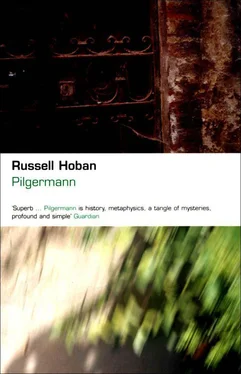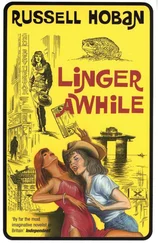Russell Hoban - Pilgermann
Здесь есть возможность читать онлайн «Russell Hoban - Pilgermann» весь текст электронной книги совершенно бесплатно (целиком полную версию без сокращений). В некоторых случаях можно слушать аудио, скачать через торрент в формате fb2 и присутствует краткое содержание. Год выпуска: 2002, Издательство: Bloomsbury Publishing PLC, Жанр: Современная проза, на английском языке. Описание произведения, (предисловие) а так же отзывы посетителей доступны на портале библиотеки ЛибКат.
- Название:Pilgermann
- Автор:
- Издательство:Bloomsbury Publishing PLC
- Жанр:
- Год:2002
- ISBN:нет данных
- Рейтинг книги:5 / 5. Голосов: 1
-
Избранное:Добавить в избранное
- Отзывы:
-
Ваша оценка:
- 100
- 1
- 2
- 3
- 4
- 5
Pilgermann: краткое содержание, описание и аннотация
Предлагаем к чтению аннотацию, описание, краткое содержание или предисловие (зависит от того, что написал сам автор книги «Pilgermann»). Если вы не нашли необходимую информацию о книге — напишите в комментариях, мы постараемся отыскать её.
Pilgermann — читать онлайн бесплатно полную книгу (весь текст) целиком
Ниже представлен текст книги, разбитый по страницам. Система сохранения места последней прочитанной страницы, позволяет с удобством читать онлайн бесплатно книгу «Pilgermann», без необходимости каждый раз заново искать на чём Вы остановились. Поставьте закладку, и сможете в любой момент перейти на страницу, на которой закончили чтение.
Интервал:
Закладка:
The twenty-seventh of Ramadhan, the Lailat al-Qadr, the Night of Power on which Muhammad received his first revelation, was to Bembel Rudzuk an especially important night. ‘The Quran tells us that this Night of Power is better than a thousand months,’ he said: ‘it is all time, it is no time, it is beyond the bounds of reckoning and measurement. It may be that even the idea of it puts the mind into a special state: always on this night I have a dream that is not like the dreams of other nights; always on this night comes a strong way-showing dream.’ His face looked young, it was so full of eagerness and excitement.
As on many nights that summer we were sleeping on the roof. We stayed up late talking, and I looked for but could not find the Virgin and the Lion among the stars. ‘Only part of the Lion can be seen now,’ said Bembel Rudzuk. He tried to show me where it was but I could only recognize the Lion when together with the Virgin it made that gesture that had so imprinted itself on my mind.
Towards dawn I was awakened by a thumping on the roof: it was Bembel Rudzuk dancing in his nightdress. His eyes were closed; he was dancing in his sleep. It was a shuffling, stamping dance in which there were many formal turnings of the body, many hieratic movements of the arms close to the body. It was an earthy dance, nothing of it moved up into the air; it was as if earth had formed itself into a man and the man was dancing himself back into the earth. Bembel Rudzuk danced more and more slowly and more and more deeply until the body that I saw before me stood motionless like the nymphal shell left behind by a dragonfly. But Bembel Rudzuk, unlike the dragonfly, seemed not to have flown away into the air but to have danced himself out of his body into the earth.
The shell of Bembel Rudzuk opened its eyes and Bembel Rudzuk looked out of them.
‘Was this your dream?’ I said. ‘Were you dancing your dream?’
‘Earth,’ he said. ‘I was dancing earth.’ ‘Are you awake?’ I said.
‘Which is the dream?’ he said.
After the Lailat al-Qadr I began to think of preparing myself a little for the days that were coming. Now when I say that I see in my mind those stubborn Frankish tents before the walls of Antioch, I see the arrogance of the Franks in the way they walk, in the way they sit their horses. At that time I had seen nothing of them, I only sensed their approach, and this awareness of them moving towards us mingled with the picture that was always in my mind of the sprawled bodies of the dead Jews of our town, most of whom had never in their lives held a sword in their hands. I did not care for that style of dying, and accordingly I asked Bembel Rudzuk to instruct me in horsemanship and the use of weapons.
The prohibition of the riding of horses and the carrying of weapons by non-Muslims was not consistently enforced in Antioch; the rigour varied with the times and with the moods of the Governor and his officers. At that time Yaghi-Siyan had not yet become as uneasy about the loyalty of Christians and Jews as he was to be a few months later — it was Firouz that I had to be mindful of; as he had already taken notice of my non-wearing of a yellow turban and belt it seemed wise not to attract his attention again. Bembel Rudzuk and a servant used to ride out of the city leading a third horse and I would follow them on foot to the hills east of the Orontes where I then mounted and rode on with them. So I had the use of a horse and weapons as often as I liked, and Firouz, who of course knew about it, seemed content that his authority was recognized within the walls; in any case he made no trouble.
Bembel Rudzuk was an excellent teacher. His youth had been active and adventurous and his strength and vigour seemed little diminished at his present age; he was a dashing horseman and he was expert with bow and sword. Our rides continued even after the siege began — it was months before the blockade was complete— and after not too long a time I rode well enough for Bembel Rudzuk to say that I might have made a horseman if I had come to it earlier in life; eventually I shot well enough with the Turkish bow to bring down game; our swordplay continued in Bembel Rudzuk’s courtyard long after the rides had stopped, and with the curved Turkish sword and the straight blade both I progressed to where Bembel Rudzuk was at least as eager as I for a rest at the end of our practice. Sometimes as I swung my blunted sword I seemed to see behind Bembel Rudzuk the shadowy and as yet faceless form of actuality to come.
One day followed another through months that bore different names, numbered themselves by the sun or the moon, and began and ended on different days in the Muslim, Jewish, and Christian calendars. Strange, to live again one’s life and death in three calendars! Soon after the Lailat al-Qadr of the Hijra year 490 in the month of September of the Christian year 1097 came the Jewish High Holy Days, the Days of Awe: Rosh Hashanah, the New Year’s Day of 4858, and ten days later Yom Kippur, the Day of Atonement. Ah! then I felt my eunuchhood, my separateness from any congregation! It was no use to tell myself that God was no longer He and that accounts were no longer being kept — centuries of moral reckoning leapt up in me. It was in me; I was in it: it was like a giant wave, an impulse racing across vast expanses of time, living its motion through successive particles of mortality.
This would now be the second Rosh Hashanah and Yom Kippur since I had left my town. The last time these Days of Awe had come I had been on the road alone, there had been no congregation to be cut off from when the shofar was blown, when the Kol Nidrei was sung at the beginning of the fast and when the Ne’ilah Service was recited, the book and the gates closed, and the Shema, the ‘Hear, O Israel!’ heard at the end. Here in Antioch however there was a congregation and I had with words out of my own mouth cut myself off from it; I didn’t want to be part of anybody else’s traffic with God. But I wanted something; I thought perhaps that I wanted to hear the sound of the ram’s horn, the shofar. The urgent maleness of that trumpeting always lifted me and quickened my blood: it was so much a call to action, it was so utterly not the murmur of praying, swaying, weaponless victims — was it not itself the weapon of the ram that had borne it? And did it not also recall that ram that had appeared when the Lord stayed the hand of Abraham as Isaac lay bound and waiting for the knife? And more: this trumpeting of the ram’s horn was for me the summons from the dreadful mountain of the Law, a summons that could not be ignored or denied. And I see, now that my mind is no longer limited by my mortal identity, that this Law is nothing that could be limited to those commandments on the two stones: no, this Law that is so imperious is simply the law of the allness of the everything of which each of us is a particle. Quick! Now! Rise up from your sleep, from your unbeing! Be! Do! Respond!
Be! Do! What? Before Rosh Hashanah, as the end of the month of Elul and the beginning of Tishri approached, I went by night to the synagogue. It was huddled away among the houses of the Jewish quarter, it stood among the smells of various dyes, even those reds and purples flaunted by those knightly wearers of the Cross who were now approaching us. This not very large domed building, said by some to have been built on the ruin of a Roman smithy, had been chosen because of its thick walls through which the warlike sound of the shofar could not be heard. It stood among the houses and the rainbowed smells like an honest workman who, finished with the toil of the week, has cleansed himself and put on fresh clothes for the Sabbath. There were no windows facing the street, there was no light to be seen except what came through the open door from the inner court.
Читать дальшеИнтервал:
Закладка:
Похожие книги на «Pilgermann»
Представляем Вашему вниманию похожие книги на «Pilgermann» списком для выбора. Мы отобрали схожую по названию и смыслу литературу в надежде предоставить читателям больше вариантов отыскать новые, интересные, ещё непрочитанные произведения.
Обсуждение, отзывы о книге «Pilgermann» и просто собственные мнения читателей. Оставьте ваши комментарии, напишите, что Вы думаете о произведении, его смысле или главных героях. Укажите что конкретно понравилось, а что нет, и почему Вы так считаете.












